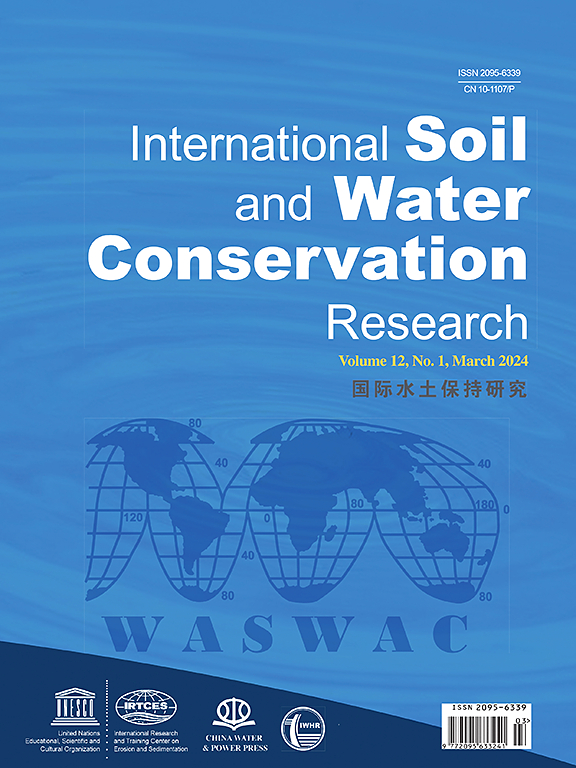政府调控对黄土高原农民土壤修复实践的促进作用:绿色生态认知的揭示
IF 7.3
1区 农林科学
Q1 ENVIRONMENTAL SCIENCES
International Soil and Water Conservation Research
Pub Date : 2025-07-23
DOI:10.1016/j.iswcr.2025.07.008
引用次数: 0
摘要
农民的土壤修复措施对改善土壤质量和确保农业稳定生产至关重要。为了分析影响这些做法的因素,我们对陕西和山西黄土高原的403名农民进行了调查。本文运用有序Probit模型和调节效应分析,考察了政府规制(特别是补贴和技术培训)的直接影响以及农民生态认知对技术采用的调节作用。结果表明:(1)农户普遍接受并实施土壤修复技术,以深耕为主;(2)政府法规,特别是补贴和培训,显著增强了农民的土壤修复力度;(3)农民的绿色生态认知正向影响其修复行为,并调节政府调控的影响;(4)政府调控和认知的影响因农户类型而异,补贴对小农更为重要,培训对大户更有利。这些见解为完善土壤修复政策、研究政府监管和农民认知的全球适用性提供了新的视角。本文章由计算机程序翻译,如有差异,请以英文原文为准。
Effect of government regulation on promotion of soil restoration practices among farmers in the Loess plateau: Unveiling the role of green ecological cognition
Soil remediation practices by farmers are crucial for improving soil quality and ensuring stable agricultural production. To analyze the factors influencing these practices, we surveyed 403 farmers in the Loess Plateau of Shaanxi and Shanxi, China. Using an ordered Probit model and moderation effect analysis, we investigated the direct effects of government regulations—specifically subsidies and technical training and the moderating role of farmers' ecological cognition on technology adoption. Our findings indicate: (1) Farmers generally accept and implement soil remediation technologies, with deep plowing being the most prevalent; (2) Government regulations, particularly subsidies and training, significantly enhance farmers' soil restoration efforts; (3) Farmers' green ecological cognition positively influences their restoration practices and moderates the impact of government regulation; (4) The influence of government regulation and cognition varies among farmers types, with subsidies being more crucial for smallholder, while training benefits larger operations more. These insights offer a new perspective for refining soil remediation policies and examining the global applicability of government regulation and farmers' cognition.
求助全文
通过发布文献求助,成功后即可免费获取论文全文。
去求助
来源期刊

International Soil and Water Conservation Research
Agricultural and Biological Sciences-Agronomy and Crop Science
CiteScore
12.00
自引率
3.10%
发文量
171
审稿时长
49 days
期刊介绍:
The International Soil and Water Conservation Research (ISWCR), the official journal of World Association of Soil and Water Conservation (WASWAC) http://www.waswac.org, is a multidisciplinary journal of soil and water conservation research, practice, policy, and perspectives. It aims to disseminate new knowledge and promote the practice of soil and water conservation.
The scope of International Soil and Water Conservation Research includes research, strategies, and technologies for prediction, prevention, and protection of soil and water resources. It deals with identification, characterization, and modeling; dynamic monitoring and evaluation; assessment and management of conservation practice and creation and implementation of quality standards.
Examples of appropriate topical areas include (but are not limited to):
• Conservation models, tools, and technologies
• Conservation agricultural
• Soil health resources, indicators, assessment, and management
• Land degradation
• Sustainable development
• Soil erosion and its control
• Soil erosion processes
• Water resources assessment and management
• Watershed management
• Soil erosion models
• Literature review on topics related soil and water conservation research
 求助内容:
求助内容: 应助结果提醒方式:
应助结果提醒方式:


